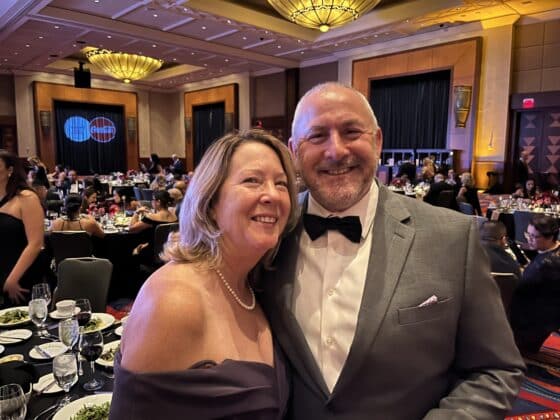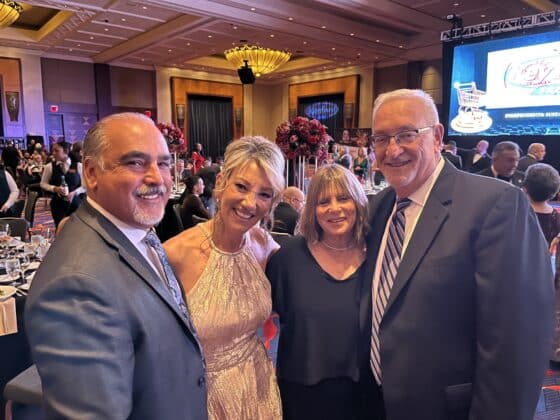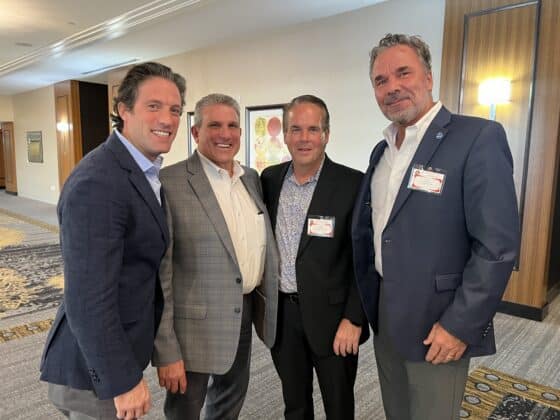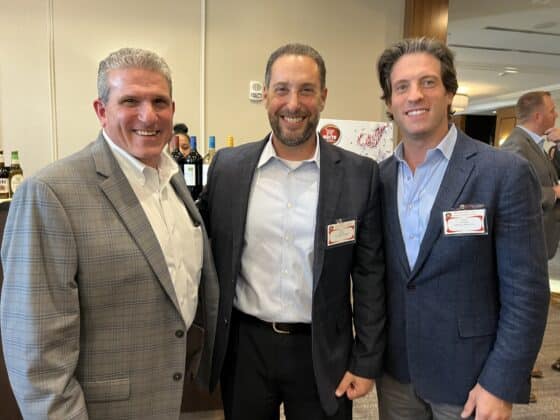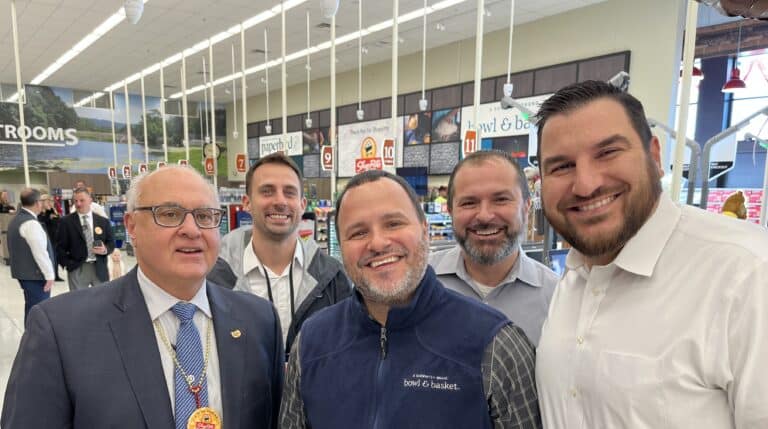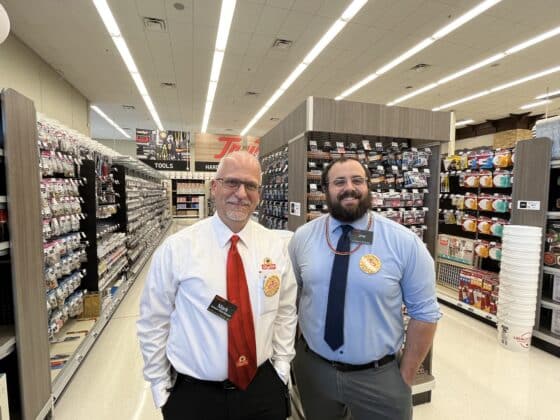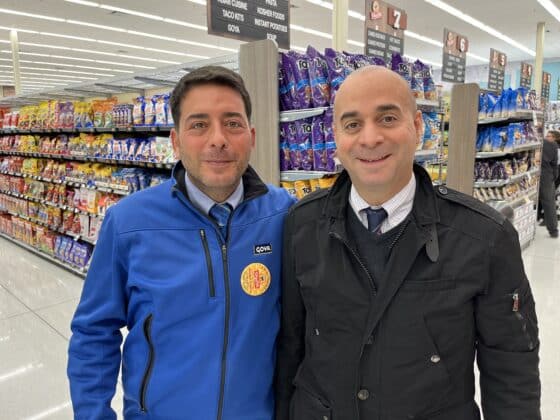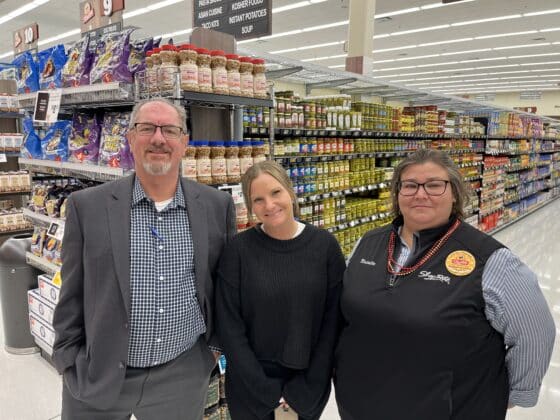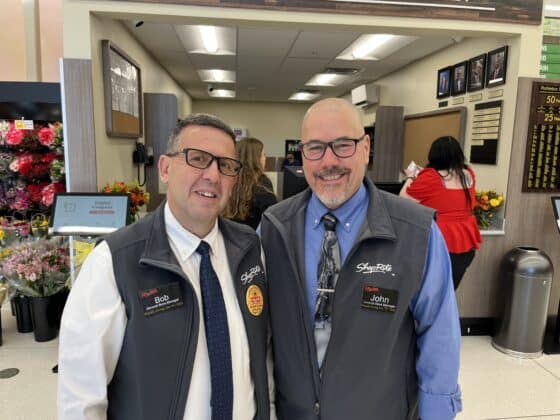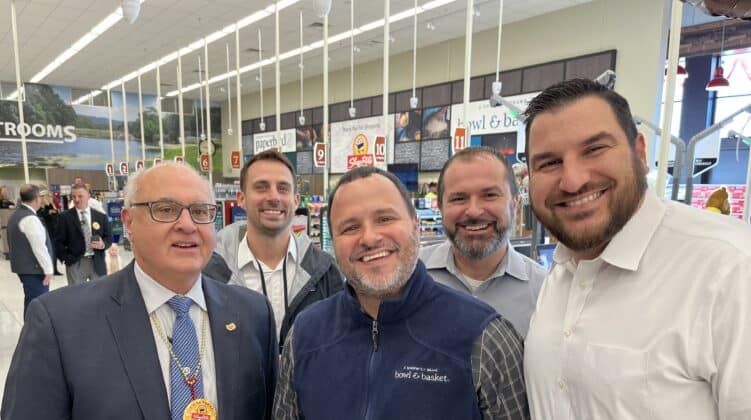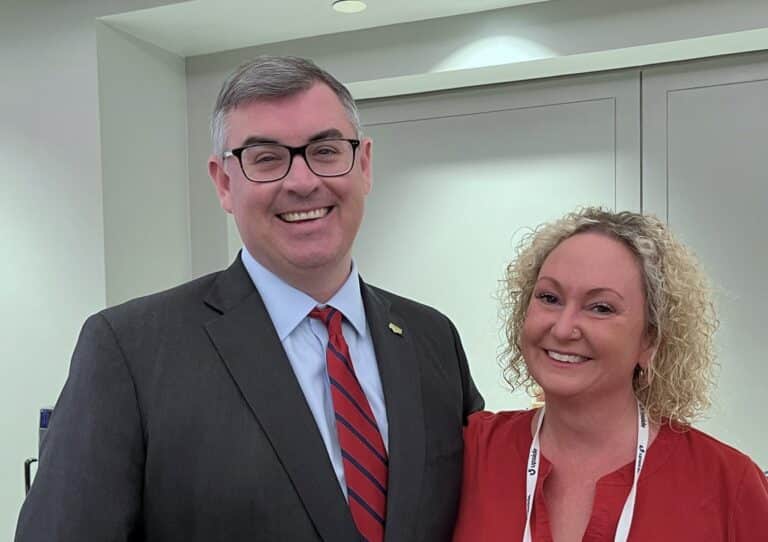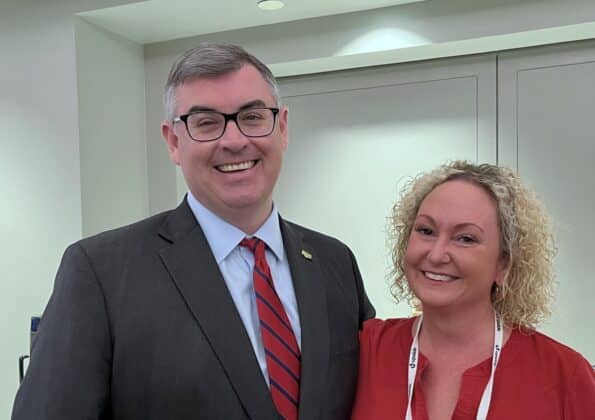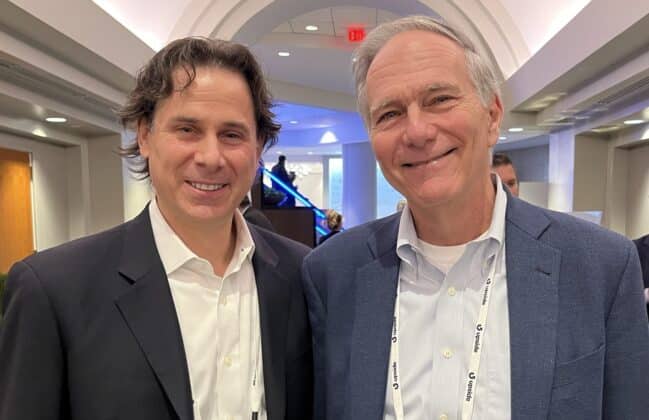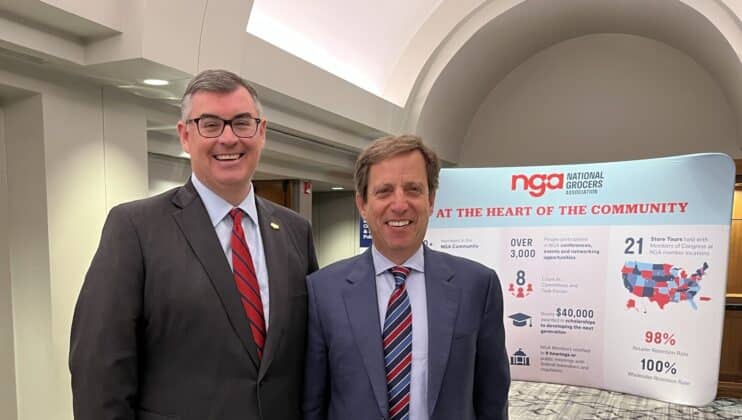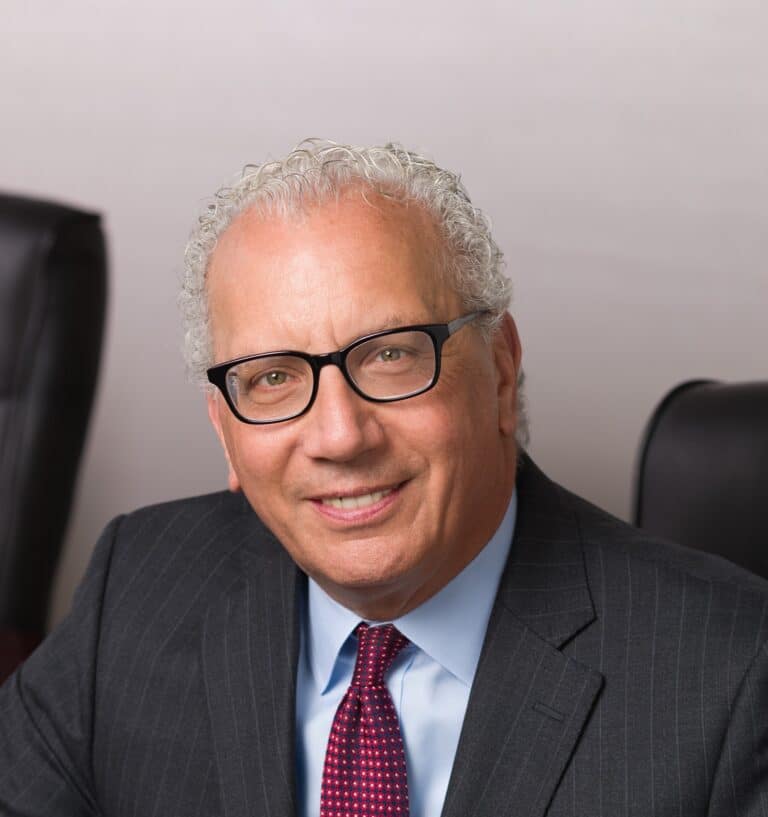Food Trade News
Changing Of The Guard At Wakefern As McMenamin Replaces Colalillo As Chairman
Sean McMenamin is the new chairman of Wakefern Food Corp., the largest grocery wholesale co-op in the U.S. The Keasbey, NJ-based distributor announced the move along with several others at its annual board of directors meeting held on October 19 at the Hanover Marriott Hotel in Whippany, NJ.
Outgoing chairman Joseph Colalillo paid tribute to the cooperative he led for 18 years as he formally welcomed Mike Stigers as Wakefern’s new president. It was the first annual meeting for Stigers, who joined Wakefern in June.
McMenamin, who served as vice chairman of the Wakefern board, is also president of McMenamin Family Markets, which operates two family-owned ShopRite stores in Philadelphia.
“Sean is a second-generation grocer who believes in the mission of our cooperative. He recognizes that Wakefern succeeds when all of its members succeed. Both Sean and Mike are strong leaders who will confidently navigate the challenges ahead to make sure Wakefern continues to grow and succeed,” said Colalillo, who will continue to serve on Wakefern’s board and lead his family company, ShopRite of Hunterdon County, which operates five ShopRite stores in New Jersey and Pennsylvania.
“It has been my great privilege and honor to serve our cooperative as chairman of the board,” added Colalillo, who thanked fellow board members, retiring (at the end of the year) Wakefern president Joe Sheridan, and associates. “Together, we have steered our company through a period of substantial growth, made investments in warehouses, technology and new and innovative marketing programs. Through our combined efforts, Wakefern’s retail banners are respected and formidable regional supermarkets in the Northeast.”
“I am honored and humbled to be here today and promise to work as hard as I can to ensure that our family-owned businesses – our Wakefern Family – thrive for generations to come,” said McMenamin, who thanked Colalillo for his leadership and mentorship.
“A desire to help people eat well and be happy has been at our core since the cooperative was founded by eight neighborhood grocers in 1946. That shared common purpose will continue to guide us and keep our members strong in this rapidly changing industry,” added McMenamin.
Wakefern also announced its annual sales at the meeting. During its fiscal year which ended on September 30, the cooperative wholesaler reported retail sales of $19.6 billion, a 5.5 percent increase from the previous year.
Colalillo also presented retiring Wakefern President Joe Sheridan with the “Chairman’s Award” for his nearly 50 years of service to the cooperative. In his last annual report on the cooperative, Sheridan said investments in brick-and-mortar stores, online shopping, technology and Own Brands continue to drive a best-in-class customer experience that strengthens Wakefern.
“As I complete my last and 28th presentation to this group, I want you to know that it has always been my privilege to present the accomplishments of all the people in this room, in our warehouses and in our stores. It has been an honor for me to serve multiple generations of ShopRite families who lead their own companies and support Wakefern,” said Sheridan.
A few days after the meeting, the city of Elizabeth, NJ, Sheridan’s hometown, renamed York Street to “Joe Sheridan Way” in honor of the retiring president. Sheridan began his career at Wakefern as a selector in the cooperative’s warehouse in Elizabeth on York Street in 1976.
Both Colalillo and Sheridan called on Wakefern members and associates to support the new leadership team with McMenamin and Stigers at the helm.
Stigers said he is focused on protecting Wakefern’s legacy while moving the company forward.
“The past 77 years has seen Wakefern achieve the considerable feat of becoming the nation’s largest retailer-owned cooperative. This cooperative has a pretty remarkable history, and I’m so grateful to be part of it. I’m excited to think about what the next 77 will bring and how we can take the next steps on Wakefern’s journey into the future,” said Stigers.
The board also named Sandra Brown, chairwoman of Brown’s Super Stores, Inc., and David Maniaci, president and CEO of Nicholas Markets, Inc., as the newest members of Wakefern’s board of directors.
Wakefern shareholders elected to the board at the meeting include: Sean McMenamin, chairman; Larri Wolfson and Dominick J. Romano, vice chairmen; Nicholas Sumas, treasurer; Lawrence Inserra Jr., and Neil Greenstein, assistant treasurers; Richard Saker, secretary; and Ned Gladstein, Shawn Ravitz and Marshall Klein, assistant secretaries.
Sam Colalillo To Join ShopRite Of Hunterdon County
ShopRite of Hunterdon County, the family-owned company that operates five ShopRite stores in New Jersey and Pennsylvania, recently announced that Sam Colalillo has joined their business.
A third-generation grocer, Sam will work with his father and president of ShopRite of Hunterdon County, Joe Colalillo, and the retail teams at the family’s ShopRite stores located in Flemington, Greenwich, and Clinton, NJ, and Yardley and Bethlehem, PA.
“We are very excited to have Sam join us in the family business,” said Joe. “Sam is a next generation leader who is passionate about growing the business in new and innovative ways to make our stores the best they can be – for our associates and customers.”
Joe Colalillo’s father and Sam’s grandfather, Joseph A. Colalillo, founded the family’s grocery business 65 years ago. Today, ShopRite of Hunterdon County employs more than 1,300 associates across stores. In addition to his role as president of the family company, Joe Colalillo has served for the last 18 years as Chairman of Wakefern Food Corp., the retailer-owned distribution and merchandising arm for all ShopRite stores.
Like his father, Sam spent time in his family’s ShopRite stores growing up and loved visiting his grandfather and dad at the stores before he could officially work. During school breaks, he worked in produce, bakery, and online shopping. His first job was cleaning price tag residue off shelves, foreshadowing his career in retail analytics.
Before returning to his family’s business, Sam served as global vice eresident of Embedded and retail analytics at NielsenIQ, creating products to help retailers and manufacturers in the food industry use scalable analytics to improve their business. From 2017 to 2021 he led NielsenIQ’s global revenue management and optimization software suite, developing price and promotion software. Prior to his product management experience, Sam supported a major manufacturer’s category management organization, using price, promotion, assortment, space, and marketing analytics to drive sales and customer engagement.
Reflecting on the transition back to his family’s stores, Sam shared that he is “thrilled to return to the business to work and train with my dad. It’s an exciting time for the supermarket industry and I look forward to getting to know our store teams and customers. ShopRite of Hunterdon County has a long commitment to the communities where our stores operate, and I want to help carry on that tradition with my parents.”
He graduated from Hamilton College with a BA in neuroscience and received his MBA in entrepreneurship from Johns Hopkins Carey Business School.
As He Changes Roles At Allegiance, Derderian Reflects On Company Growth, Impact Of Retail Theft
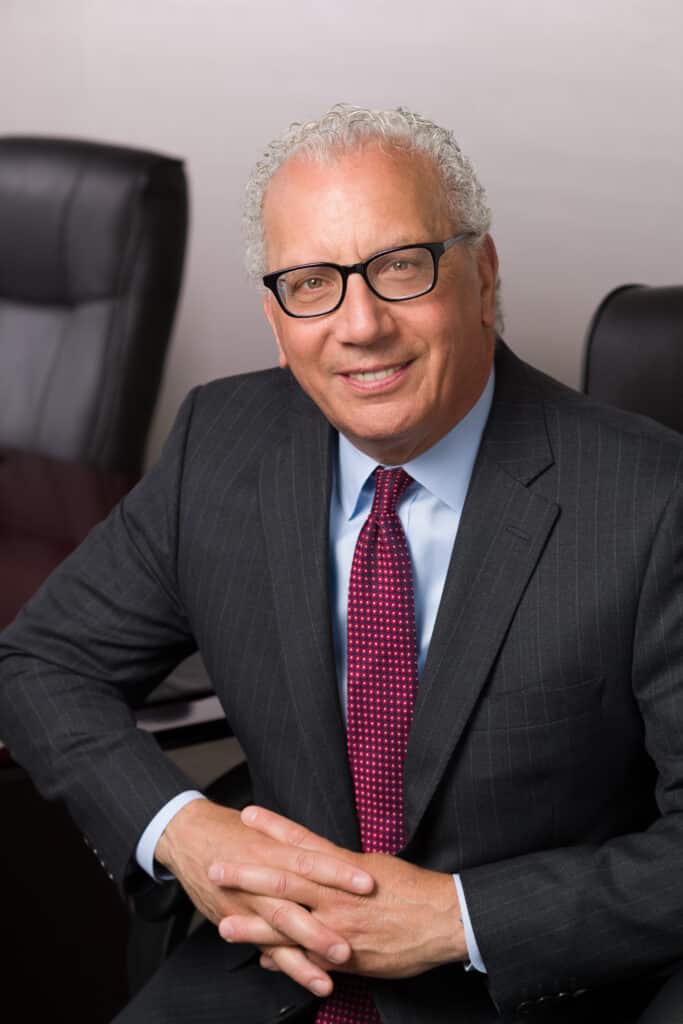
John Derderian, who recently stepped down as president of Allegiance Retail Services (ARS), the Iselin, NJ-based retail marketing cooperative, has long been an advocate for independent retailers in the New York Metro area. Before he transitioned to a new role as principal advisor for retail development and strategic business initiatives, Food Trade News asked him about Allegiance’s recent New York City growth and how retail theft has impacted independent retailers in the Big Apple.
Food Trade News: Can you give us a recap of ARS’ growth in New York City, particularly Manhattan, over the past five years? Why do you believe that ARS has been so successful in gaining net-new business and also seeing some of your current members expand their footprints in a very unique and competitive marketplace?
John Derderian: Manhattan has been a very fertile ground for Allegiance over the past five years. In June 2018, Gristedes joined the cooperative and in September 2022, Morton Williams also became members – combined, these two iconic retailers added 34 stores to our Manhattan store network. Today, including current D’Agostino’s and Foodtown banners, we have nearly 50 member stores in Manhattan! As you know, Manhattan is a unique marketplace which both offers great opportunity and presents ongoing challenges. I think the key to acquiring new members and incenting existing owners to grow in Manhattan the existence of a mutually-beneficial relationship between the owner-groups and the Allegiance professional staff – whereby the staff knows the market, but the iconic members live the market. So, everyday the professional staff fights to lower the cost of goods, but they are also acutely aware of when to cede activities and direction (marketing and merchandising) to the store-owners – so each constituency contributes their expertise and ‘stays in their lane’ to win in the market.
Food Trade News: We can’t mention retailing in NYC today without mentioning the large and growing retail theft issue. Can you summarize how bad the problem is (statistically and/or anecdotally) and explain what you believe are the major reasons the problem has currently gotten so out of control?
John Derderian: Retail theft is currently at unprecedented levels, with the most troubling aspect being that it is clearly under-reported. Many storeowners and store associates don’t even bother to call or report theft to the police, knowing that there will be no consequence to the perpetrator if they are apprehended by the police … and THAT is the problem. Local district attorneys have not shown an inclination to prosecute retail theft cases, which means the criminal element is left unchecked, and further providing a level of comfort to criminals that there is a new tolerance for non-violent crimes.
Food Trade News: Do you believe there is a legislative solution that would improve the situation?
John Derderian: Certainly, reverse the bail reform laws which have recently been neutered, and pressure the DAs to prosecute all crimes, inclusive of retail theft (which sometimes does lead to violent crime). One of the by-products of the progressive reforms we have seen implemented in New York (and other populated cities), is that criminals actually feel a sense of entitlement; ‘they have the right’ to take what they want … and given the reality of prosecution today – that’s not surprising. Even if laws were changed today, the psychology of entitlement will take some time to abate in our culture, which I think will be measured in years.
Food Trade News: Some retailers have told us that they have added facial recognition technology to help identify repeat offenders when they first enter a store. Currently there are two pending bills introduced by New York City Council members that would ban this technology. Do you have an opinion about this?
John Derderian: Those of our members who have deployed facial recognition technology have seen a material drop in the number of retail theft incidents in their stores. There is empirical data which shows this, and it is a meaningful drop. The New York City Council is being influenced by reports that users are selling surveillance information or precluding relatives or those associated with criminals from being allowed to enter a food store – which is pure nonsense. If passed, this would be another case of legislative intentions gone bad.
Food Trade News: What have been the current and what do you believe will be future ramifications to retailers who are impacted by increasing theft?
John Derderian: There will be a new normal of retail shrink, which will be passed to consumers in the form of higher prices. Additionally, retailers will be circumspect about carrying certain items for fear of becoming pilferage ‘favorites’ – big ticket and seasonal items, and items which carry high gross profit. Combine that with a current environment of locking up targets of thieves (Tide; HBC products), and stores will appear to be in sales prevention mode, which will invariably lead to less four-wall sales and increased online sales (which often results in a lower gross profit). The bottom line is – both the consumer and bricks-and-mortar stores lose.
Food Trade News: Although there is a “hands off” the perpetrators rule, many operators (who can afford it) opt to still employ off duty police and/or security details. Do you find that this is a measurable deterrent for theft/violence?
John Derderian: It often does prevent retail theft but at a cost (security detail). So, either way, the retailer is paying more for the progressive legislation which has been enacted over the last few years.
Food Trade News: Does the announcement of a new NYPD Police commissioner (Ed Caban) give any hope that some enforcement might come about, and the mayor and governor will listen?
John Derderian: Among my greatest fears regarding this issue is that the citizens of the city and local politicians will become numb to the issue of retail theft. Whether it is a new police chief or even a new city administration, at some point they will move onto another issue which is reflecting the brightest light … issues we may not even contemplate today. Heightened retail theft will melt into the subconscious and become one of the ‘realities’ of living in the city.
Food Trade News: Are you working with any of the advocacy groups that have been petitioning the state and city for help in this fight against crime?
John Derderian: Sure, we have two primary advocacy groups who are assisting in this effort – New York lobbyist, Geto & de Milly (engaged by Allegiance), and – through the auspices of the NSA – the CAPS (Collective Action to Protect Our Stores) Coalition. Geto & de Milly is focused more specifically on the New York City Council and the mayor’s office, with the goal of sensitizing the elected officials to the implications legislation has on hard-working, tax-paying entrepreneurs and rank-and-file workers, while the CAPS Coalition is more broad-based, seeking to amplify the issues through both public communication and meeting with city, county and state legislators to seek legislative change. Obviously, the New York Food Industry Alliance is our permanent advocate in Albany and has represented our industry well for many years.
Food Trade News: How has the crime wave affected your labor situation? Have you been able to retain/entice employees to remain/join your establishments?
John Derderian: Even without the specter of workplace crime, hiring has been wildly difficult. Whether a function of the continued government assistance during COVID, material competition for the same labor pool or a perception that retail in general, and food retail more specifically, is not an ideal or preferred place of employment, the industry has had an extremely difficult time hiring and maintaining a full workforce. Without question, the element of crime has affected our workforce. Not only have our associates in many instances witnessed crime and possibly violence in our stores, but many travel to work using public transportation, which has also seen a heightened level of crime (on trains and buses) – each contributes to a negative influence. And if the prospective part-time employee isn’t dissuaded by the uptick in crime, often their parents are, and they refuse to allow their young adult children (a cohort the industry relies on) to commute to work. All of this leads to staffing shortages and as a by-product, less service to our customers and ironically, fewer employee eyes in the store to deter pilferage.
Food Trade News: Statistically, the number of independent stores (and owners) in the U.S. has shrunk dramatically over the past decade and that trend continues today. What has ARS done to buck that course and what does ARS bring to the table that you would consider a differentiator from the other member-services companies that are competing for the same business?
John Derderian: This represents the easiest answer in this set of questions – it is our professional staff. As a true cooperative which distributes every penny of income generated back to our storeowners (members), our experienced staff is not focused on selling services to our members, but rather, singularly working to improve the sales and profitability of our member’s companies. Our mission is “…provide to our membership customized services that optimize their retail success…” that is how our staff approaches their role every day. In the New York metropolitan area, where demographics change by the block, customization is key, and providing the means for family businesses to succeed is our ultimate goal.
Food Trade News: Thank you.
Marianne Santo, Longtime Wakefern Produce Executive, Dies At 61

Marianne Santo, an integral member of Wakefern’s produce division for 38 years and the first woman president of the Eastern Produce Council, died on September 24.
Affectionately known as the “Watermelon Queen” for her skillful management of that important summer category, Santo was admired for being an industry pioneer, a tough but fair negotiator and, more recently, a mentor to younger generations of produce buyers.
“Marianne was first and foremost a mentor and friend to many,” said Ross Farnsworth, vice president of Wakefern’s produce division. “She was also very active in being a positive voice in the produce industry and an advocate for our Wakefern family members. She will be greatly missed.”
Santo began her Wakefern career in 1985 in the produce store services department and was tapped within a year to join the buying team. On her path to becoming a senior category manager, she secured high-volume items in key categories; navigated countless crop-impacting storms, both literal and figurative — “I’ve lived on the Weather Channel for 35 years,” she once said—and forged close working bonds with teammates, vendors, members and retail associates alike.
Santo was aware of her role as an industry barrier breaker. As a woman in a field then dominated by men, she was a self-described “novelty” when she attended her first Eastern Produce Council (EPC) meeting. She rose up the organization’s ranks, co-chairing the Women’s Leadership Committee and others before becoming director, vice president and, in 2019, the EPC’s first woman president.
A graduate of Douglass College, Santo was also a Tribute to Women and Industry (TWIN) honoree, winner of the Shelby Report’s Women of Influence in the Food Industry Award, a member of the International Advisory Board for United Fresh and frequently participated as a “Thought Leader in the Produce Industry” at the New York Produce Show.
Along with her husband, Carmine, Santo is survived by her sisters, brother-in-law, nieces and nephews.












